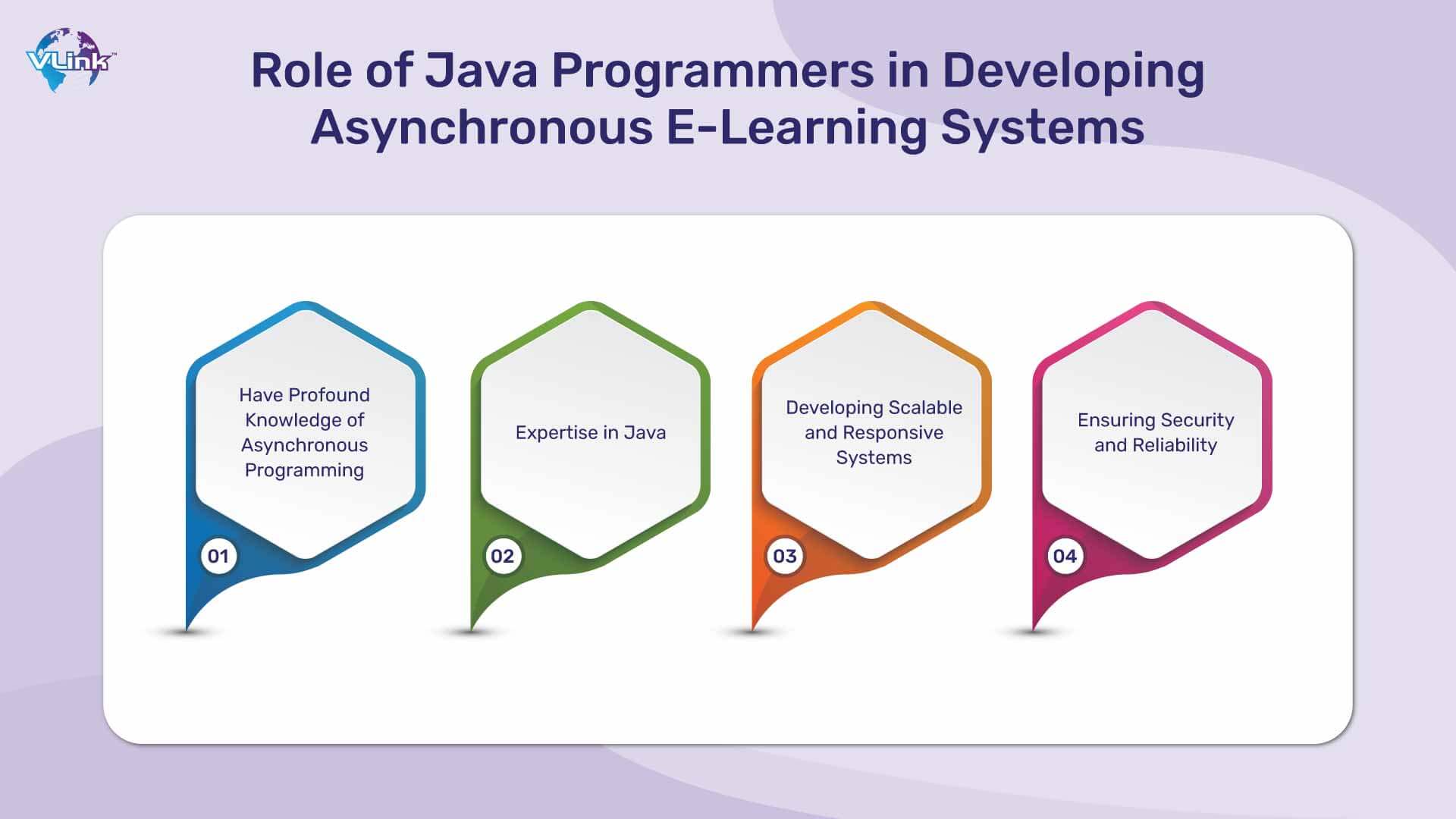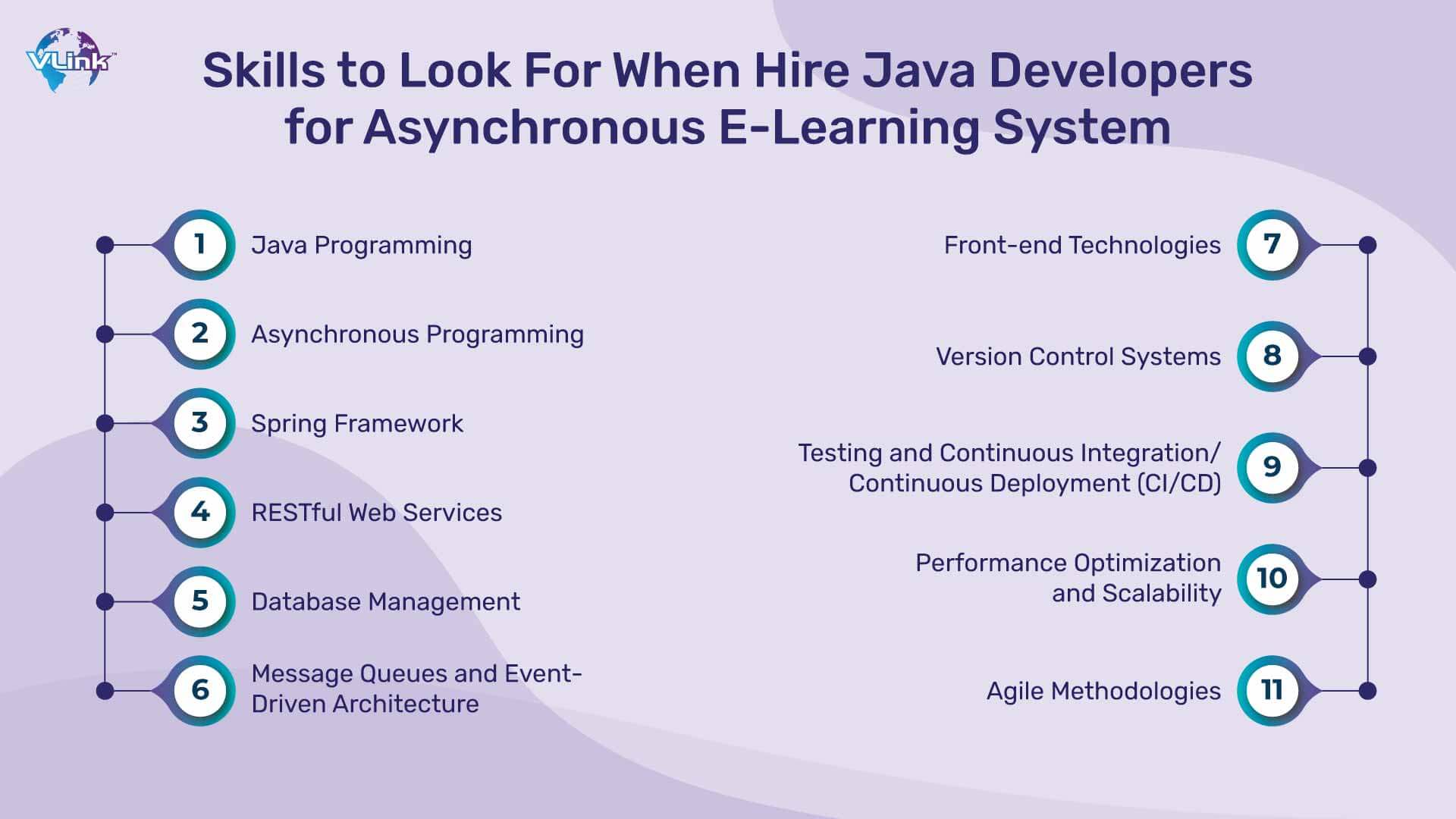The e-learning market size was valued at USD 399.3 billion in 2022 and will move in 2032 USD 1 Trillion with a 14% CAGR. It's segmented into Asynchronous (Self-Paced) & Synchronous e-learning systems.
The global Online Self-Paced Learning market is predicted to reach US$ 14.1 billion by 2030, with CAGR of more than 7.2%.

Asynchronous e-learning is also known as self-paced learning and flexible learning systems. Moodle, Canvas, Coursera: Several popular Asynchronous eLearning systems are built using Java programming language.
So, if you are planning to build an asynchronous eLearning system, hire Java developers from a dedicated IT staffing company - VLink.
In this blog, we will explore roles & skills that need to be considered when hiring Java programmers for the Asynchronous eLearning system.
The Role of Java Programmers in Developing Asynchronous E-Learning Systems

Have Profound Knowledge of Asynchronous Programming
Asynchronous programming enables tasks to be executed independently without blocking the main program's execution. E-learning systems mean learners can access course materials and interact with the platform anytime.
Expertise in Java
Java is known for its reliability, portability, and scalability. Java developers possess the skills and knowledge required for asynchronous e-learning systems development. They are proficient in utilizing Java libraries, frameworks & IDEs to implement asynchronous tasks seamlessly. Hire developers who is expertise in Java and its libraries and frameworks.
Developing Scalable and Responsive Systems
Scalability and responsiveness play a vital role in modern e-learning platforms. Experienced Java programmers have experience in designing & developing scalable architectures that can handle many concurrent users while ensuring excellent performance.
In addition, experts know how to build an eLearning app like Duolingo using Java's multithreading capabilities and distributed computing frameworks like Akka or Spring.
Ensuring Security and Reliability
Security and reliability are essential in Asynchronous e-learning systems, especially when handling sensitive user data and facilitating online assessments.
Ensure you hire Java developers who are well-versed in implementing robust security measures to protect against potential threats.
Skills to Look for When Hire Java Developers for Asynchronous E-Learning System

Here are several skills that need to be considered when hiring Java programmers to build an Asynchronous eLearning system:
Java Programming
Proficiency in core Java programming is essential as the entire system is likely to be built using Java libraries and frameworks.
Asynchronous Programming
Understanding asynchronous programming concepts is crucial for handling concurrent tasks efficiently. Java provides mechanisms like CompletableFuture, ExecutorService, and asynchronous I/O to manage asynchronous operations effectively.
Spring Framework
Spring provides comprehensive support for building Java applications, including features like dependency injection, aspect-oriented programming, and MVC architecture.
RESTful Web Services
E-learning systems often rely on RESTful APIs for communication between client applications and servers. Developers should be familiar with frameworks like Spring MVC or JAX-RS for building RESTful web development services in Java.
Database Management
Knowledge of database management systems (DBMS) and proficiency in SQL are essential for designing efficient database schemas, querying data, and optimizing database performance. Familiarity with frameworks like Hibernate or Spring Data JPA can simplify database operations in Java applications.
Message Queues and Event-Driven Architecture
Asynchronous e-learning systems may benefit from message queue systems like RabbitMQ or Apache Kafka for handling asynchronous communication between different system components. Understanding event-driven architecture principles can help in designing scalable and responsive systems.
Front-end Technologies
While Java developers may not primarily work on front-end development services, having a basic understanding of HTML, CSS, and JavaScript can be beneficial for collaborating with front-end developers and troubleshooting integration issues.
Version Control Systems
Proficiency in version control systems like Git is essential for managing codebase changes, collaborating with team members, and ensuring code quality and consistency.
Testing and Continuous Integration/Continuous Deployment (CI/CD)
Java developers should be familiar with different types of testing frameworks like JUnit and Mockito for writing unit tests and ensuring code quality through automated testing. Knowledge of CI/CD pipelines and tools like Jenkins or Travis CI can streamline the development workflow and facilitate frequent, automated deployments.
Performance Optimization and Scalability
E-learning systems must handle many concurrent users efficiently. Developers should be skilled in identifying performance bottlenecks, optimizing code, and designing scalable architectures using caching, load balancing, and horizontal scaling techniques.
Agile Methodologies
Experience working in Agile environments, such as Scrum or Kanban, can help Java developers collaborate effectively with cross-functional teams, prioritize tasks, and deliver features iteratively.
By considering these roles & skills, you can evaluate the expertise of Java programmers before hiring them for Asynchronous learning system development. If you are looking for dedicated team Java developers for hire to build your self-paced learning system like Moodle or Canvas, VLink is the right choice.
Contact VLink to Hire Java Programmers
VLink is a dedicated IT staffing company with an extensive network of experienced developers in the United States. Our rigorous pre-vetting process selects the top 3% of Java programmers with significant experience in building Asynchronous eLearning systems. With us, you can hire Java developers for your following projects within 48 hours.
For more information, contact us now!
Frequently Asked Questions
The cost to hire Java developers for building asynchronous e-learning systems varies depending on factors like experience level, project complexity, and geographic location. On average, hourly rates can range from $50 to $150 per hour. For a full-time developer, monthly salaries may range from $4,000 to $12,000.
Hiring Java programmers for an asynchronous e-learning system offers several benefits. Java's robustness, platform independence, vast ecosystem of libraries and frameworks, strong community support, and scalability make it an ideal choice for building complex, high-performance systems like asynchronous e-learning platforms.
Additionally, Java's asynchronous programming capabilities ensure efficient handling of concurrent tasks, which are crucial for real-time interactions and scalability in e-learning systems.
To hire Java developers effectively:
- Define project requirements and skills needed.
- Source candidates through job boards, professional networks, and developer communities.
- Screen resumes and portfolios.
- Conduct technical interviews to assess Java proficiency.
- Evaluate soft skills and cultural fit.
- Offer competitive compensation and benefits.
- Onboard selected candidates efficiently.














